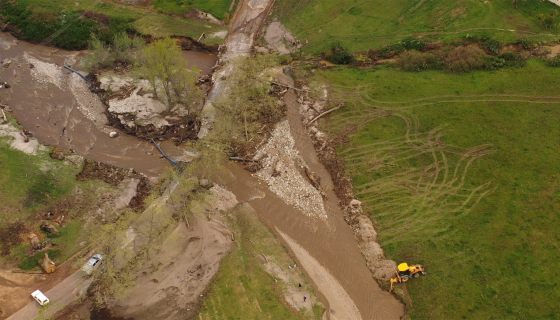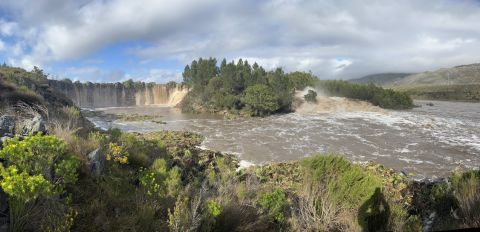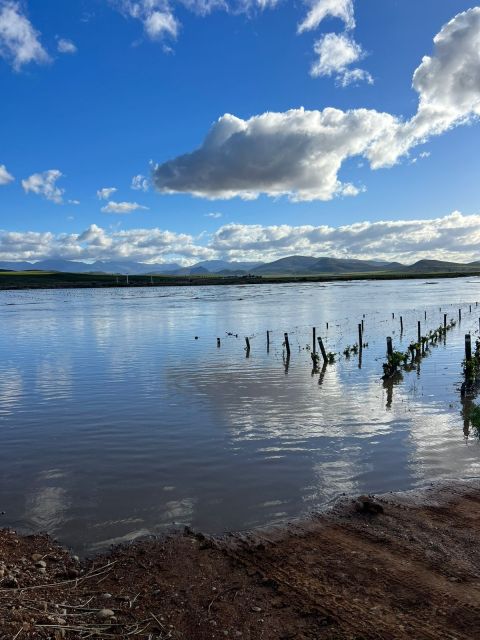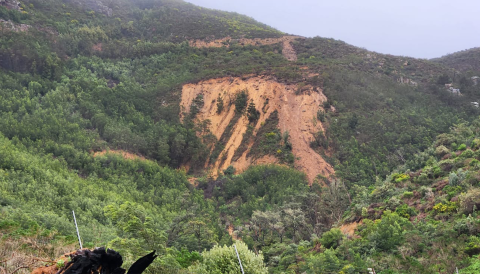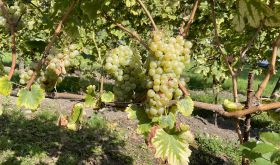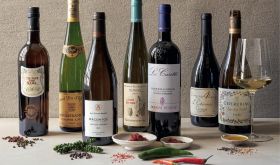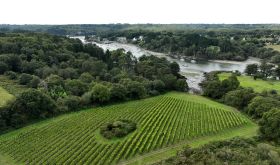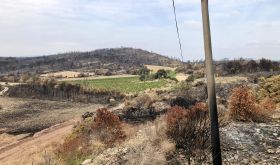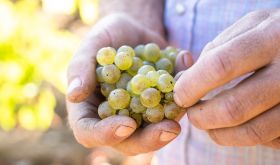On what is traditionally the weekend that South Africans go outside and ‘braai’ in honour of the country’s Heritage Day, a cataclysmic flood literally washed away any such intentions. A level-nine storm began on the afternoon of Sunday 24 September and lasted late into the following day. According to the Cape’s Department of Infrastructure, early hydrology calculations have indicated that a storm this extreme happens just once every 200 years.
Now, two weeks after the event, the extent of the damage is becoming clear. At least 11 people have lost their lives. Widespread destruction across the province includes flooded homes, destroyed infrastructure and devastated crops. More than 80 roads were closed, and many remain so, especially in farming and wine-producing areas. For South African wine, the event is impacting both wine tourism and exports, as producers are unable to transport their wares to the harbour for shipping.
One of the closed roads is the MR269, better known as the Hemel-en-Aarde road [where Jancis visited just last May], a scenic thoroughfare that winds past all the famous estates of the same-named ward, one of the last being Creation Wines.
‘We measured 309 millimetres [12 in] of rain in 18 hours in our GenZ Chardonnay block’, owner Carolyn Martin reported. Martin’s biggest concern is wine tourism as well as the Pebbles Bridge that was destroyed. ‘We desperately need to get this repaired so 160 students can go to school.’
To get his wines to market, Hannes Storm of Storm Wines made a human chain across the river, passing boxes from one person to the next to load them onto his ‘bakkie’ (South African for pick-up truck) to drive to the warehouse himself. This anecdote comes from Jessica Saurwein, a winemaker who sources grapes for her eponymous brand from Hemel-en-Aarde. She recently acquired Waterval farm in nearby Stanford, where she is planting Pinot Noir and Riesling. She’s most worried about leaf damage. ‘The young vines need all the photosynthesis they can get as they have used up winter reserves and need to put out new growth.’
Further west, in Elgin, 11 dams burst their walls (many of which were around 80 years old), which has caused more major flooding in lower-lying areas in the valley, flooding orchards, roads and electricity and pipe infrastructure. ‘We got 230 millimetres [9 in] of rain in 24 hours’, said fourth-generation farmer Paul Cluver, who is the managing director of his family’s brand. ‘This has resulted in significant runoff and landslides never seen before by anyone still living. The main river running through De Rust burst its banks, taking out all bridges on the farm and flooding roads, main pipelines and apple orchards.’ The village is still without clean running water.
Perhaps surprisingly given the magnitude of the storm, Cluver and many others report no significant vineyard damage. James Downes, proprietor of Shannon Vineyards on the Palmiet River, is grateful for the timing of the rain. ‘Thank goodness the Chardonnay had just budded, and everything else was coming into bud, so it was still early on’, he said. What’s more concerning now, at the beginning of the growing season, is the saturation levels of the soils. ‘We will need to control vigour.’
In neighbouring Bot River, Sebastian Beaumont of Beaumont Family Wines said, ‘This was like no flood I have ever seen in my 49 years of living on this farm.’ The bridge from which their farm gets its name, Compagnes Drift, has been lost, as well as six hectares (15 acres) of fruit orchards. ‘We are trying to preserve the remaining orchards [about 5 ha]. These are key to our total business balance and will have massive long-term effect. Short term is the challenge of repairing the blocks and roads on the farm.’ The vineyards, however, have survived. The issue now is high disease pressure: temperatures are hovering around 20 °C (68 °F), with high humidity and more rain predicted. Currently they are spraying by hand as the soils are too wet for tractors.
Over the mountain pass and into Franschhoek, chef Margot Janse reports, ‘Franschhoek is full of devastation – there is mud everywhere.’ Janse runs Isabelo, a charity that feeds over 1,500 school children every day. ‘Our delivery van floated down the river, which is normally a road … it’s a total write-off.’ They’ve had to evacuate their premises, and have set up temporary operations at Klein Goederust Boutique Winery.
Several old-vine wine producers here have reported damage to farms and roads, including Chamonix and Rickety Bridge. Spokesperson for the Old Vine Project Nadia Hefer has set up a donation page for funds to be allocated specifically to producers who had damage to their sites.
At Môreson, winemaker Clayton Reabow told me, ‘We lost roughly 1,500 square meters [16,000 ft2] of land here including 25% of our single-vineyard FYM Chardonnay.’ Chris Alheit reports that two big pine trees collapsed in the famous La Colline vineyard. Planted in 1936, the Sémillon here goes into a wine of the same name as well as into well-known Chenin-led blend, Cartology.
In the more land-locked Robertson, Springfield Estate has been badly affected. ‘Fifty hectares [124 acres] of vineyards of our hundred were completely under water,’ said Jenna Kruger, marketing manager of her family estate. ‘The tops of the poles were covered – you could go over the vineyards with a boat!’
Her biggest concern is the buds on the vines. ‘The debris from the flood needs to be cleared without breaking off the buds’, she says, ‘and it remains to be seen how the immersed buds will be affected.’
South Africa’s oldest and most historic regions Constantia and Stellenbosch were largely unaffected, although in Stellenbosch’s Polkadraai Hills, Duncan Savage has lost part of a new high-density Syrah vineyard, planted ‘on the highest, steepest slope in the area’.
‘It’s been without problems all winter long … until the storm’, said Savage. ‘On that weekend the southeaster blew straight into the slope, dumping an obscene amount of water on already saturated soil. Our surface-water management was spot on but a newly planted vineyard is not all that stable. The soil in about a third of the block just turned to slurry and gave way to a proper mudslide.
‘Anyway, it is what it is. We have just lost time and money. Once dry enough we’ll begin replanting the problem area before the end of the year. The vineyard will be epic’, affirmed Savage with his characteristic optimism.
While Savage, Martin, Beaumont, Kruger et al get down to the business of rebuilding and replanting, there’s another story at play. Several NGOs work exclusively in the Cape winelands, such as the Pebbles Project, which provides educational programmes as well as nutrition, health and social support services to approximately 1,400 children. These organisations will no doubt experience a knock-on effect with funding as well as damaged infrastructure, as is the case with Isabelo.
How you can help
Purchase and drink South African wine [there are nearly 6,000 recommendations in our tasting-note database], particularly from the affected areas, as well as donate to these Cape winelands charities that aid farm workers:

